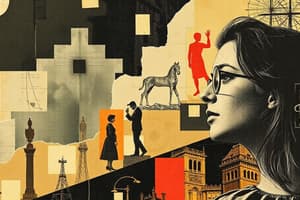Podcast
Questions and Answers
Who is often considered the golden age of English drama?
Who is often considered the golden age of English drama?
- Queen Elizabeth I
- William Shakespeare (correct)
- Christopher Marlowe
- Ben Jonson
Which playwright is renowned for exploring themes like love, betrayal, and revenge?
Which playwright is renowned for exploring themes like love, betrayal, and revenge?
- Ben Jonson
- Queen Elizabeth I
- Christopher Marlowe
- William Shakespeare (correct)
What artistic form aims to entertain, educate, or enlighten?
What artistic form aims to entertain, educate, or enlighten?
- Novel
- Prose
- Drama (correct)
- Poetry
Which period in English drama saw a shift towards realism and social issues?
Which period in English drama saw a shift towards realism and social issues?
Who wrote plays like 'Romeo and Juliet,' 'Macbeth,' and 'Othello'?
Who wrote plays like 'Romeo and Juliet,' 'Macbeth,' and 'Othello'?
Which literary form boasts a rich history dating back to the Middle Ages?
Which literary form boasts a rich history dating back to the Middle Ages?
Who is considered the father of English poetry?
Who is considered the father of English poetry?
Which movement addressed taboo topics like war, politics, and mental health in drama?
Which movement addressed taboo topics like war, politics, and mental health in drama?
Which poet wrote 'The Canterbury Tales'?
Which poet wrote 'The Canterbury Tales'?
What do drama and poetry have in common?
What do drama and poetry have in common?
Which playwright explored modern themes like technology and the human psyche?
Which playwright explored modern themes like technology and the human psyche?
What is a common theme explored in both drama and poetry?
What is a common theme explored in both drama and poetry?
Flashcards are hidden until you start studying
Study Notes
English Literature: Exploring Drama and Poetry
English literature boasts a rich and diverse tapestry, woven together from the threads of drama and poetry. These two artistic forms have a long and intertwined history, shaping our cultural landscape and offering unique windows into the human condition. In this exploration, we'll delve into the fascinating world of English drama and poetry, uncovering their shared roots and distinct identities.
Drama
Drama, in its simplest definition, is a dramatic arts performance that aims to entertain, educate, or enlighten. English drama has a rich history dating back to the Middle Ages, starting with the medieval mystery plays that depicted religious stories.
The Elizabethan period, named after Queen Elizabeth I, is often considered the golden age of English drama. Playwrights such as William Shakespeare, Christopher Marlowe, and Ben Jonson emerged during this time, each leaving a lasting legacy on the English literary landscape.
Shakespeare, in particular, is renowned for his exploration of human nature, penning plays that delve into complex themes such as love, betrayal, and revenge. Plays like "Romeo and Juliet," "Macbeth," and "Othello" still resonate with today's audiences and continue to be performed and studied worldwide.
In the 20th century, English drama shifted towards realism and social issues. Playwrights such as George Bernard Shaw, Noël Coward, and Harold Pinter contributed to this movement by addressing topics that were once considered taboo, such as war, politics, and mental health.
Poetry
Poetry offers an intimate and introspective view of the human experience, often exploring themes of love, loss, and the natural world. English poetry dates back to the Anglo-Saxon period, with early works such as "Beowulf" and "The Dream of the Rood" providing the foundation for the English poetic tradition.
Geoffrey Chaucer, an early 14th-century poet, is widely considered the father of English poetry. His collection of poems, "The Canterbury Tales," offers a colorful tapestry of medieval life through the characters' stories.
William Shakespeare, once again, played a central role in the development of English poetry. In addition to his plays, Shakespeare penned sonnets that further explored themes of love, loss, and the human condition.
In the 18th and 19th centuries, romantic and Victorian poets such as William Wordsworth, Lord Byron, and Elizabeth Barrett Browning emerged, each contributing their unique voices to the English poetic tradition.
In the 20th century, English poetry continued to evolve, with poets such as W.H. Auden, T.S. Eliot, and Sylvia Plath exploring modern themes like technology, war, and the human psyche.
Unique Shared Traits
Despite their distinct identities, drama and poetry share several unique traits. Both forms employ language, imagery, and rhythm to create evocative and memorable works that resonate with audiences. Furthermore, both drama and poetry explore universal themes such as love, loss, and the human condition.
Conclusion
English drama and poetry offer an enriching and engaging study of human nature, providing a unique lens through which we can explore themes such as love, loss, and the human condition. From medieval mystery plays to modern social issues, the English literary canon is a testament to the human spirit's enduring quest for self-understanding and connection. Whether you're a student, a teacher, or a lifelong learner, delving into the world of English drama and poetry is sure to ignite your imagination and inspire new perspectives.
Studying That Suits You
Use AI to generate personalized quizzes and flashcards to suit your learning preferences.




